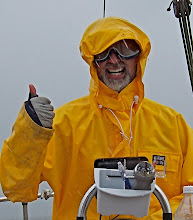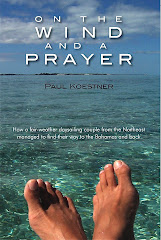
Now why would anyone put something like that
out here in the middle of nowhere?
The Forces That Be
What’s the deal here? What besides nautical hubris possesses us to rehash the same old fireside advisories? To be sure, there has always been much in the way of hazards to concern even the most casual day sailor. But beyond that I think there is the desire in most who have learned something the hard way to pass on knowledge to fellow enthusiasts in order to help them avoid the same calamities, while we incidentally get ourselves published. What goes around comes around. Then there is this: most of us have repeatedly proven that the message hasn’t sunk in yet. So here’s my story:
Some years ago my wife Deborah and I were sailing out of Long Island Sound’s Manhasset Bay on a borrowed twenty-eight foot O’Day. Between boats at the time (if you don’t have a boat, you’re between them), we were fortunate in that Deb’s father would let us use his when he wasn't on the water himself.
When not sailing, I was doing my homework: thumbing through Chapmans, practicing my knots, and following the adventures of others in magazines that have turned me down flat, the bastards. It was a fun way to pass the time waiting for my turn on the water. Knowledge is power, and the use of another’s valuables is further cause for due diligence. We’re not borrowing the hedge clippers here, after all.
On the day of my story, Deb and I would be hopping the boat one harbor over to enjoy the fireworks commemorating some holiday or other. The evening was shaping up nicely, and a light following breeze was forecast, once we cleared the point to starboard out of our bay. We were looking forward to sailing wing and wing, always an inspiring sight, and a technique that makes us feel particularly “salty”. Even the phrase has a poetic ring, don't yuh think?
Trouble is generally more prosaic. The thing about it is that it so often visits when we’re perfectly at ease and all seems in order. I often look at the Long Island Sound now when it’s full of activity, and remind myself that a good percentage of the folks enjoying themselves out there still have plenty to learn about boating. Who doesn’t? And I think how easily bad things can happen to those whose perceptions are lulled by the apparent tranquility their liquid carpet provides. Not unlike a bird soaring gracefully through the air until the sky becomes a plate glass window.
To clear our bay, boats have to pass channel marker 27, a green can set and maintained by the Coast Guard to mark the Sound’s main thoroughfare for, let’s face it, the commercial traffic and big boats that regularly ply these waters, right? We had to round that buoy, or follow the time-honored tradition of cutting it inside, something folks do all the time, many in boats considerably larger than ours. All one needs to do is give plenty of room to starboard for the clearly viewable rocks at Barker’s Point, and watch out for the hazard buoy marking Success Rock to port, something you take on faith, since the rock never shows itself. We lined ourselves up, set our sails and headed downwind toward the fireworks display, having saved ourselves maybe fifteen minutes of sailing through a beautiful evening.
With Deb at the helm and Success Rock dutifully avoided, I went forward to pose like a precious bow ornament. It’s a great view up there, and I thought I’d enjoy it for a moment.
A moment was about all I got. As I gazed at the surface, what would have been a common and pleasant view in the Caribbean made my stomach turn. Just ahead, a patch of sea had turned a mottled light green, almost turquoise hue. That uncharacteristic color was news enough, but the surface had a boil to it that set off multiple alarms in my cranium. I had enough time to cry out an expletive useless to the helmsman, and then the boat shuddered, and rocked.
I will not bore with the details of the next ten minutes, since I don’t remember them with any reliability. What I remember are impressions, mostly those of confusion and fear. Thankfully we were making only a few knots prior to impact. Even so, tranquility turned to chaos as the sails attempted to drive us further on to the mysterious obstruction. We loosed the sheets and dropped the now flailing sails. Funny how only a few knots of wind will turn against you when you resist them.
One saving grace was the fact that the boat’s engine was an outboard mounted on a stern bracket. I lowered it into the water and started it up. All the while the boat bumped and rolled like a whale trying to beach itself. Since we hadn’t cleared whatever was down there, I tried to back it out. That’s when we discovered our steering was jammed, locked into a shallow left turn. Further, we had to battle a current that wanted to force the issue with the obstruction. Our outboard won the argument, and with its maneuverability we were able to counteract the boat’s tendency to head to port.
We were in the process of crabbing back home when Deb asked a reasonable question. Were we taking on water? I went below to check, and found a good deal in the bilge. But was it normal? I had to confess that I didn’t know the boat well enough to be sure. I also didn’t know if an automatic bilge pump should be working. I looked at the electric panel and found a switch labeled bilge pump, and threw it. I didn’t hear anything. I went topside and looked over the side of the boat to see a river of water coming out of the thingy. Yes, the thingy. Stress had reduced my vocabulary to little more than a few monosyllabic grunts in short order.
Not wanting to call the Coast Guard for fear of being made to sit in the corner of the harbor wearing a hazard cap, we instead called a loyal boating friend. He immediately hopped in his Tiara (God love any floating boat, sail or no) and showed up to give his moral support. He then double-crossed us and alerted the Coast Guard himself, and they showed up to escort us home, first instructing us to don our florescent orange, meet-you-in-the-shallow-end life jackets.
I deserved it. Something wasn’t quite right though with Deb’s ensemble, and I asked her where her shoes had gone, since she’d recently become barefoot. I didn’t want to break yet another axiom at sea, since I’d already been rebuked by the Coast Guard captain for leaning too far over the side to look for damage. It was then that my wife hit me with a stunning piece of logic. Upon hearing that I’d found significant amounts of ocean in the boat’s basement, and figuring that she might have to abandon ship, Deb had taken her shoes off and stored them in a portable cooler for safe keeping, figuring if we didn’t float safely to shore, maybe at least they would. Now hear this. There should be a woman on every boat that sails the seas. They sweat the details.
We made port, had the boat pulled, and discovered that a flexed keel was allowing water to enter at the hull/keel joint. The rudder, skegless and naked to the elements, had sat on the rock and been wedged against the hull in its port-bound inclination.
Bad luck, huh? Bad seamanship, actually, had gotten us in this mess. After getting home and allowing my blood pressure to recede, I pulled the local charts. There between the known hazard and the familiar shoreline was one spot marked with a depth of six feet. There was no ominous name for it, no buoy to warn of its existence, no friendly fisherman anchored nearby to wave us off as we approached. Of course six feet was the low tide mark and Deb’s father’s boat drew less than that, by several inches. I calculated the time of the accident and checked the tide charts. Dead low tide. I then searched the sky for the moon. It was lovely, all of it. My mind buzzed with a slightly incongruous message: when all else fails, read the instructions. I proceeded to punch myself about the head with both fists.
The Coast Guard puts those cans there for all of us, not just the big guys, and we ignore them at our peril. Further, nature has a penchant for sneaking up on us in creative and insidious ways. Factors compound as the earth and moon perform their orbital dance through the cosmos, and man’s attempts to map the choreography can’t begin to capture the rich organic story. I had picked a bad moment to ignore nature’s show in my haste to see some manmade incendiaries. Had we chosen a path a few feet to either side we may have remained blissfully ignorant of our negligence. On the other hand, another knot or two of wind speed and the boat might have foundered where we struck.
I like to think I’ve learned a little since then, some of it necessarily the hard way, about the value of diligence due this enjoyable, yet demanding avocation. My father-in-law paid for that lesson in lost time on the water, as it took several weeks for all repairs to be completed. I paid for it in part out of my pride (my nickname now is Rock Hunter), a small tithe in the scheme of things. Others may take those kinds of chances, but I won’t again. Being ready for the challenge of sailing, even in “protected waters”, requires preparedness that shouldn’t diminish its enjoyment. If anything, for me it enhances the pleasure, for I feel I’ve earned it all the more.





No comments:
Post a Comment